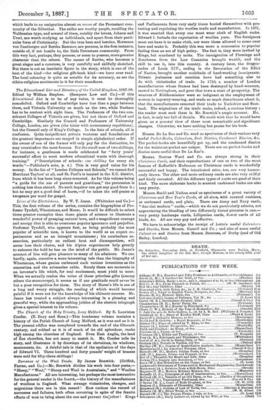Romance of the Wool Trade. By James Bonvrick. (Griffith, Ferran,
and Co.)—Mr. Bonwick divides his work into four parts,— " Sheep," "Wool," "Sheep and Wool in Australasia," and "Woollen Manufactures." All are interesting, but perhaps the most instructive for the general reader is the fourth,—the history of the manufactures of woollens in England. What strange viciesithdes, changes, and migrations there are in this record ! How curious the record of immense and failures, both often occurring in spite of the frantic efforts of men to bring about the one and prevent the:other ! Kings and Parliaments from very early times busied themselves with pro- tecting and regulating the woollen trade and manufacture. Iu 1261, it was enacted that every one must wear cloth of English make. Edward I. forbade the exportation of woollen yarn. The foreigners must not have it to make cloth, nor were these allowed to come over here and make it. Probably this was more a concession to popular feeling than an act of high policy. The fact is, they were invited by Kings, but murdered by mobs. The immigration of Flemings and Dutchmen from the Low Countries brought wealth, and the skill to use it, into this country. A. century later, the dragon- nades of Louis XIV., ending in the Revocation of the Edict of Nantes, brought another multitude of hard-working immigrants. Private jealousies and enmities have had something also to do with vicissitudes of trade. In 1710, a number of London manufacturers whose frames had been destroyed by band-weavers, moved to Nottingham, and gave that town a start of prosperity. The weavers of Kidderminster were no indignant at the employment of women in tapestry-weaving, and made so much disturbance about it, that the manufacturers removed their trade to Yorkshire and Scot- land. The migrations of the trade make, indeed, a curious history ; the reader must seek them in Mr. Bonwick's ample account. He, in fact, is only too fall of details. We could with that he would have given us a general view of these most remarkable and significant changes. Otherwise, we have nothing bat praise for his book.









































 Previous page
Previous page